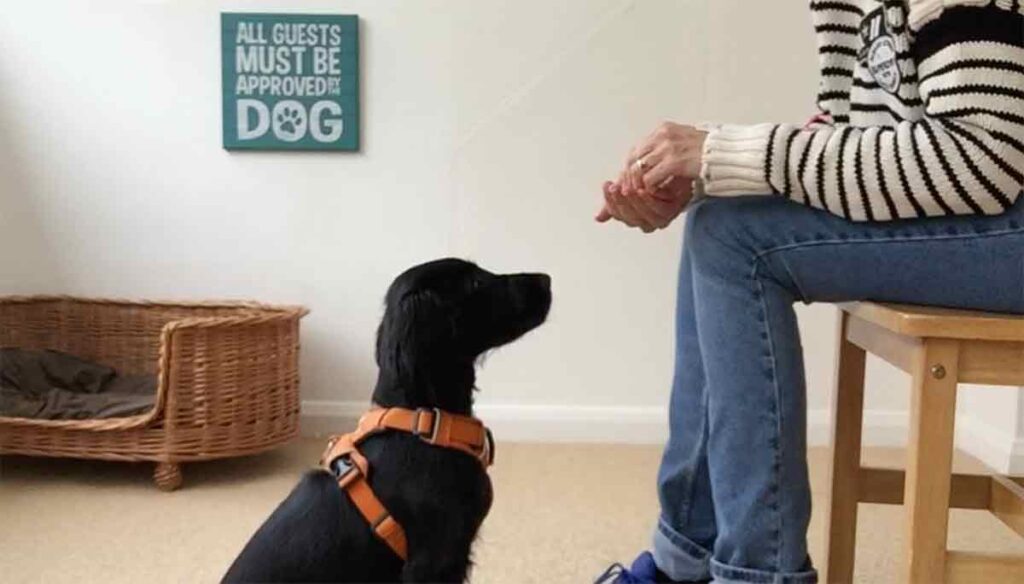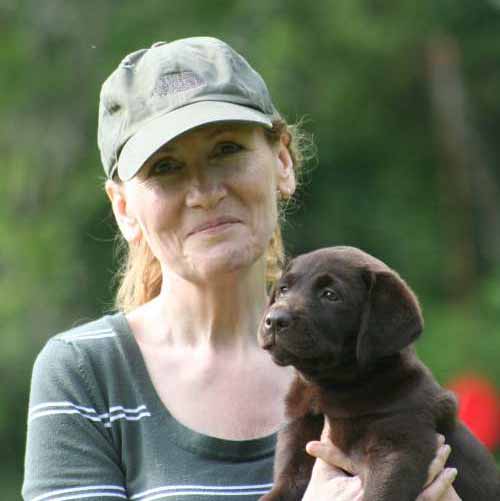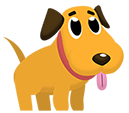Puppies are playful, enthusiastic, and always up for a bit of fun. The ability of many puppies to get excited over just about anything, is part of their appeal. But there is another side to the coin.
Puppies are also prone to getting over excited to the point where they appear to have lost all control over their behavior, and become quite difficult to manage.

I’ll talk about how to calm a puppy that has gotten into this state, but as with so many things, its even better if you can prevent the state happening in the first place. So you’ll need to be able to recognize the signs.
Signs Of Over Excitement In Puppies
Different puppies have different ways of telling you that things are getting a bit too much for them.
Rapid high pitched, repetitive barking, lunging back and forth nipping at anything that comes near their face is one sign. Biting and barking at outstretched hands, or an attack of the zoomies can be another.
One thing is certain, when your puppy completely loses their mind, you’ll know about it. And you’ll need to be very calm and follow a procedure that works in order to restore the peace.
We’ll talk about that in a moment. But you’ll get better at spotting the melt-down in advance as you get to know your puppy.
For example, if your puppy usually loves to be stroked and have you run your hands down their ears in a soothing and repetitive way, but right now is turning to bite at your hand every time you attempt to do this, its a sign that they are getting over wrought.
Before we look at solutions to over-excitement in pups, let’s look at some of the triggers that can get you and your puppy into this situation in the first place. You might also want to check out my ‘biting solutions‘ article
Causes Of Over Excitement
The number one cause of over excitement is rough, physical, play. But there are other factors to consider. These are the three main causes:
- Rough play
- Genetics
- Over stimulation
What Do I Mean By Rough Play?
If you are pushing or pulling any part of your puppy with your hands or feet, or any other part of your body, that’s physical play. And puppies love it!
The problem is, they love it too much, and this is how dogs play with one another. So you are essentially giving your puppy permission to treat you like another dog. Which includes biting.
They may only be play bites, and they won’t hurt a dog with a thick fur coat. But on human skin, they can hurt a lot.
The other problem is that physical play winds puppies up. It gets them more and more excited. And just how excited they get, will depend to some extent on their temperament
What Do Genetics Have To Do With It?
Genetics play a big part in just how excited a puppy will get in different situations. Some breeds have a greater tendency to be excitable than others, and there are wide differences between individuals within a breed.
My young Labrador for example, is very mellow and calm. She’s always been this way, and even a first time puppy parent would have had no problem keeping her calm, even if some family members had engaged her in physical play.
My young English Cocker Spaniel on the other hand, is the opposite. She is running on rocket fuel and had I wound her up in any way as a pup she would have lost her mind with excitement. A first time puppy parent without the right advice, might have ended up with a very different dog from the sweet little soul that is my constant companion today.
So, its important to work with the temperament of your dog, and to strictly limit physical play with an excitable puppy, where you might get away with it if your pup is a more chilled individual. If you are not sure about your puppy’s temperament, the best thing is to avoid physical play between your puppy and humans.
That doesn’t mean ‘no fun’, it just means engaging with your puppy in different ways.
The temperament your puppy has inherited, will also affect how susceptible your puppy is to over stimulation.
What Do We Mean By Over Stimulation?
Everything that your puppy can see, smell, hear and touch, is a stimulus. And just like people, dogs are sensitive to too much stimulation, and vary in their ability to cope with it.
An over-stimulated puppy just has too much going on around them. It’s very common for a new puppy’s senses to be bombarded with information. New smells, constant visitors, people getting excited around them, touching them, poking them, feeding them, carrying them, calling them. And more.
There comes a point when it’s all a bit much and the puppy’s senses are overwhelmed. And at this point, the puppy may become extremely excitable, and display the kinds of behavior we’ve talked about. Biting, yapping and so on.
Stepping In
You need to step in, ideally before the puppy gets to this point. And take steps to ‘bring the puppy down’ from their high, to a more relaxed state.
And whatever the cause of your puppy’s over excitement, stepping in means reducing the stimulation that is flooding your puppy’s senses for a little while.
Calming Techniques
If you are playing with your puppy, stop. Stand up and stand still. Many puppies recognize this as a sign that the game has ended and will also stop whatever it was they were doing.
If the puppy carries on biting or barking, if possible remove yourself from the puppy so that they cannot touch you. Stepping out of your puppy zone is ideal.
If you cannot get away from your puppy, or they are biting or barking at other people, pick the puppy up, hold them firmly and if possible, place them in a crate for a few minutes.
The important thing is to drastically reduce the stimulation, from people, other dogs, noise, physical handling etc. So that the puppy can start to relax.
You can put a towel or blanket over the crate to help reduce the stimulation. Puppies will often quickly fall asleep when you do this.
When Will My Puppy Calm Down
So how long do these mad moments keep occuring? Is your puppy going to grow out of this behavior?
The answer is that dogs do calm down as they age.
To a degree.
But adolescence can be a very excitable stage for some dogs so you really do need to learn how to manage this now. Before your dog gets stronger and more determined.
Bear in mind that the excitable puppy is always going to be a more excitable dog than the mellow puppy. But once your dog is mature, some of the things that got them excited as a puppy will be less of a big deal.
They will also likely be better at coping with exciting situations. And people generally are less likely to wind up your dog once they are older and less puppyish.
Socialization
Interestingly, well socialized dogs can appear to be less over-excitable than those who haven’t experienced as many things during that window of opportunity when they first arrive home.
If you make a big effort to show your puppy lots of different people, places, sounds and sights from 8 to 12 weeks old, they are likely to take these things in their stride later on and not be overly stimulated by them going forward.
Reinforcing Calm
Helping puppies to be calm is not just about anticipating over excitement and stepping in. You can also teach puppies that being calm is rewarding and worthwhile for them.
We use a game called ‘Catch The Relax’* for this.
You’ll spend some time watching your puppy and have some treats ready to hand. You are waiting for them to lie down quietly. And when they do, you will calmly place a treat between their paws.
*’Catch The Relax’ can be found on Day 5 of our Puppy Games course
Routines And Games
With puppies, routines and structured games are your friend. Routines, not only because they help the puppy understand that there are times to relax and times to play
But because they give you more structure to your day and help you relax too. And dogs pick up on our vibes. Your puppy will feel more relaxed if you are okay and happy with your day.
Structured games are a great way to replace rough and tumble play with your pup. They give you and your family a way to interact with the puppy without the puppy getting themselves into a whirlwind of excitement. And at the end of the day, everyone is calmer and happier for it. So I hope you’ll give them a try!

Free Training Tips
Get Pippa's free dog training tips delivered to your inbox

 Why Don’t I Like My Puppy?
Why Don’t I Like My Puppy?
Thanks, I have puppy mother German Shepard, feather Rottweiler. she’s big puppy. I also have male Rott. Grown. They get along fine but that puppy is packed full of clumsy happiness!!
You advise and tips help.
Thanks
Glad you are finding the tips helpful Kevin, good luck with your puppy training.